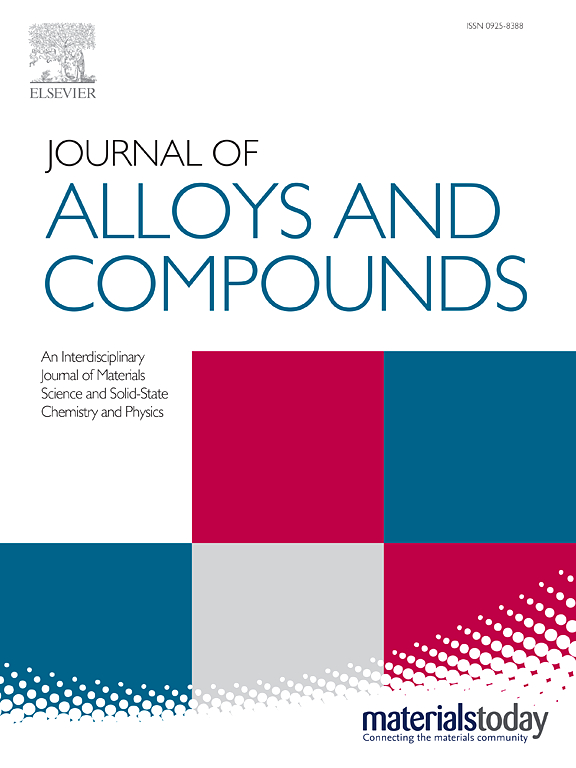在共掺杂 Sc3+ 和 Ta5+ 离子的巨幂率 TiO2 陶瓷中大幅提高湿度传感性能并实现超低磁滞误差
IF 5.8
2区 材料科学
Q2 CHEMISTRY, PHYSICAL
引用次数: 0
摘要
本研究探讨了不同Sc3+浓度(1%、2.5%和5%)的ScyTa0.025Ti0.975-yO2(y%ScTTO)陶瓷的介电性能和湿度传感性能。这些陶瓷是用固态反应法合成的。X 射线衍射分析证实了主要金红石型二氧化钛相的存在,没有任何杂质相。陶瓷呈现出高密度的微观结构,相对密度超过 92%。平均晶粒尺寸随着 Sc3+ 掺杂浓度的增加而增大。元素图谱显示,1%ScTTO 和 2.5%ScTTO 样品中的元素分散均匀,而 5%ScTTO 样品中的 Scrich 相沿晶界发生了偏析。所有样品都显示出 103-105 的巨介电常数,随着 Sc3+ 浓度的增加而降低。值得注意的是,1%ScTTO 和 2.5%ScTTO 样品显示出明显的湿度敏感性。当相对湿度从 30% 增加到 90% 时,这些样品的电容分别增加了 100% 和 1700%。值得注意的是,2.5%ScTTO 样品的滞后误差极小,在 1 kHz 频率下测得的滞后误差为 1.09%。此外,这些样品的响应和恢复时间都非常快,分别为 1 分钟和 0.15 分钟。在高达 12 V 的直流偏压下,1 kHz 和 25 °C 的湿度传感性能保持稳定,但当温度升至 50-75 °C 时(无直流偏压),湿度传感性能显著增加。湿度感应性能的增强和巨大的介电响应归因于缺陷的形成和晶界效应。本文章由计算机程序翻译,如有差异,请以英文原文为准。
Greatly Enhanced Humidity Sensing Performances with Ultra Low Hysteresis Error in Giant Permittivity TiO2 Ceramics Co–doped with Sc3+ and Ta5+ Ions
This study investigates the dielectric and humidity sensing properties of ScyTa0.025Ti0.975-yO2 (y%ScTTO) ceramics with varying Sc3+ concentrations (1%, 2.5%, and 5%). The ceramics were synthesized using a solid state reaction method. X
state reaction method. X ray diffraction analysis confirmed the presence of the main rutile TiO2 phase without any impurity phases. The ceramics exhibited a high
ray diffraction analysis confirmed the presence of the main rutile TiO2 phase without any impurity phases. The ceramics exhibited a high density microstructure with a relative density exceeding 92%. The mean grain size increased with higher Sc3+ doping concentrations. Elemental mapping showed homogeneous dispersion in the 1%ScTTO and 2.5%ScTTO samples, while the 5%ScTTO sample exhibited segregation of a Sc
density microstructure with a relative density exceeding 92%. The mean grain size increased with higher Sc3+ doping concentrations. Elemental mapping showed homogeneous dispersion in the 1%ScTTO and 2.5%ScTTO samples, while the 5%ScTTO sample exhibited segregation of a Sc rich phase along the grain boundaries. All samples demonstrated a giant dielectric constant of 103–105, which decreased as the Sc3+ concentration increased. Notably, the 1%ScTTO and 2.5%ScTTO samples displayed significant humidity sensitivity. The capacitance of these samples increased by 100% and 1700%, respectively, as the relative humidity increased from 30 to 90%. Remarkably, the 2.5%ScTTO sample exhibited minimal hysteresis error, measured at 1.09% at 1 kHz. Furthermore, these samples showed very fast response and recovery times, ∼1 and 0.15 min, respectively. The humidity sensing properties at 1 kHz and 25 °C remained stable under a DC bias of up to 12 V but showed a significant increase when the temperature was raised to 50–75 °C (without DC bias). The enhanced humidity sensing performance and giant dielectric response were attributed to the formation of defects and the grain boundary effect.
rich phase along the grain boundaries. All samples demonstrated a giant dielectric constant of 103–105, which decreased as the Sc3+ concentration increased. Notably, the 1%ScTTO and 2.5%ScTTO samples displayed significant humidity sensitivity. The capacitance of these samples increased by 100% and 1700%, respectively, as the relative humidity increased from 30 to 90%. Remarkably, the 2.5%ScTTO sample exhibited minimal hysteresis error, measured at 1.09% at 1 kHz. Furthermore, these samples showed very fast response and recovery times, ∼1 and 0.15 min, respectively. The humidity sensing properties at 1 kHz and 25 °C remained stable under a DC bias of up to 12 V but showed a significant increase when the temperature was raised to 50–75 °C (without DC bias). The enhanced humidity sensing performance and giant dielectric response were attributed to the formation of defects and the grain boundary effect.
 state reaction method. X
state reaction method. X ray diffraction analysis confirmed the presence of the main rutile TiO2 phase without any impurity phases. The ceramics exhibited a high
ray diffraction analysis confirmed the presence of the main rutile TiO2 phase without any impurity phases. The ceramics exhibited a high density microstructure with a relative density exceeding 92%. The mean grain size increased with higher Sc3+ doping concentrations. Elemental mapping showed homogeneous dispersion in the 1%ScTTO and 2.5%ScTTO samples, while the 5%ScTTO sample exhibited segregation of a Sc
density microstructure with a relative density exceeding 92%. The mean grain size increased with higher Sc3+ doping concentrations. Elemental mapping showed homogeneous dispersion in the 1%ScTTO and 2.5%ScTTO samples, while the 5%ScTTO sample exhibited segregation of a Sc rich phase along the grain boundaries. All samples demonstrated a giant dielectric constant of 103–105, which decreased as the Sc3+ concentration increased. Notably, the 1%ScTTO and 2.5%ScTTO samples displayed significant humidity sensitivity. The capacitance of these samples increased by 100% and 1700%, respectively, as the relative humidity increased from 30 to 90%. Remarkably, the 2.5%ScTTO sample exhibited minimal hysteresis error, measured at 1.09% at 1 kHz. Furthermore, these samples showed very fast response and recovery times, ∼1 and 0.15 min, respectively. The humidity sensing properties at 1 kHz and 25 °C remained stable under a DC bias of up to 12 V but showed a significant increase when the temperature was raised to 50–75 °C (without DC bias). The enhanced humidity sensing performance and giant dielectric response were attributed to the formation of defects and the grain boundary effect.
rich phase along the grain boundaries. All samples demonstrated a giant dielectric constant of 103–105, which decreased as the Sc3+ concentration increased. Notably, the 1%ScTTO and 2.5%ScTTO samples displayed significant humidity sensitivity. The capacitance of these samples increased by 100% and 1700%, respectively, as the relative humidity increased from 30 to 90%. Remarkably, the 2.5%ScTTO sample exhibited minimal hysteresis error, measured at 1.09% at 1 kHz. Furthermore, these samples showed very fast response and recovery times, ∼1 and 0.15 min, respectively. The humidity sensing properties at 1 kHz and 25 °C remained stable under a DC bias of up to 12 V but showed a significant increase when the temperature was raised to 50–75 °C (without DC bias). The enhanced humidity sensing performance and giant dielectric response were attributed to the formation of defects and the grain boundary effect.
求助全文
通过发布文献求助,成功后即可免费获取论文全文。
去求助
来源期刊

Journal of Alloys and Compounds
工程技术-材料科学:综合
CiteScore
11.10
自引率
14.50%
发文量
5146
审稿时长
67 days
期刊介绍:
The Journal of Alloys and Compounds is intended to serve as an international medium for the publication of work on solid materials comprising compounds as well as alloys. Its great strength lies in the diversity of discipline which it encompasses, drawing together results from materials science, solid-state chemistry and physics.
 求助内容:
求助内容: 应助结果提醒方式:
应助结果提醒方式:


